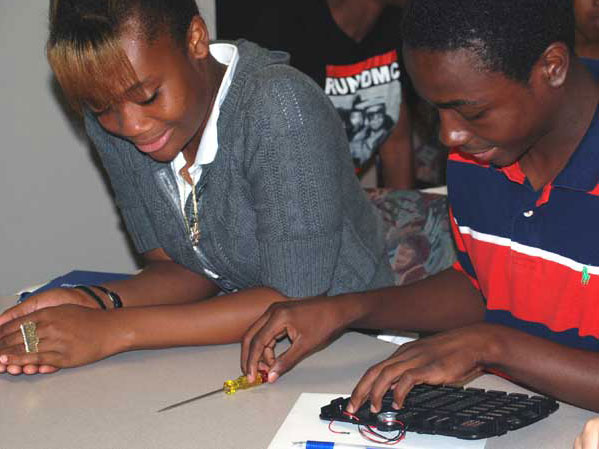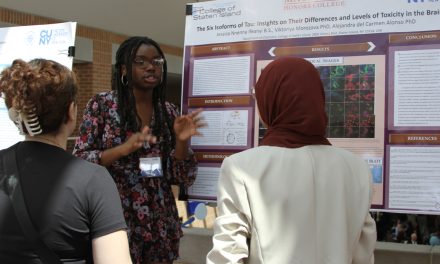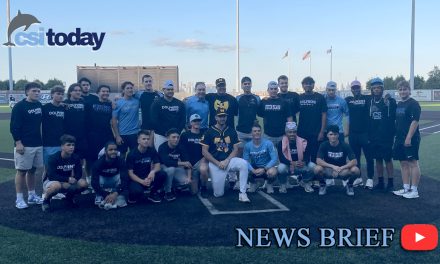At first glance, the third workshop at the College of Staten Island (CSI) involving 20 Staten Island high school students looked like a lot of fun as the students began to assemble their mechanized LEGO® Mindstorms® kits.
They are also learning the essential elements of engineering, and the basic concepts of the scientific method, thanks to the $5,000 grant from National Grid (formerly known as Keyspan) that made this summer program possible.
Courtney HaneyEXPLORING THE ENGINEERING WORLD
Courtney Haney, who is going into her sophomore year at Moore Catholic High School, says, “It’s teaching us extra stuff. When I grow up, I want to be a singer and major in the performing arts, but it’s always good to have extra stuff under your belt. In case that doesn’t work out, I can move on to the next thing. I might find that I want to move on to engineering.”
Brittany Ridges and Jareed AlleyneJerrod Alleyne, who will be a junior at Port Richmond High School this fall, agrees that the workshops are broadening his horizons, “I like it. It’s teaching me something different and giving me more variety in what I want to do.”
Ronald BakerRonald Baker, who will be a sophomore at Curtis High School, notes, “I’ve been learning a lot about engineering—what it does and how it makes stuff work better, like microchips and microcontrollers, how to control mostly everything we use every day.”
Elizabeth AboabaThe workshops even encouraged at least one student to think seriously about a career in engineering. Describing the workshops as “an amazing experience,” Elizabeth Aboaba, who will be in her junior year this fall at Curtis High School, was initially thinking about going into banking, but now she thinks that she might want to become an engineer.
“It is widely known in education that if students learn fun ways to approach problem solving then they will be more inclined to consider careers in science, technology, and more specifically engineering,” said Robert Huber, interim vice president for advancement at CSI.
The four-workshop summer series is hosted by CSI’s Liberty Partnership Program, a collaborative college-school-community-based project that provides a broad range of instructional, enrichment, and support services to at-risk students and their families. The main purpose of the Liberty Partnership is to increase the motivation and ability of students to move on to post-secondary education and/or meaningful employment.
ENGINEERING SUCCESS
Dr. Neo AntoniadesOn the engineering end, Neo Antoniades, Associate Professor of Engineering Science and Physics at CSI and the instructor at each workshop, states that the workshops are “very important [because they] expose students to the sciences and engineering at the earliest stage possible. Studies have shown that is really the age were you have to introduce them to some kind of design contest so that they eventually get a good idea about the sciences and engineering, if you want to get some of these students to come into college and do engineering…
“The idea was to first teach the students a little bit about what engineering is and what engineers do,” continued Antoniades, who holds two U.S. patents with three others pending. “The experience also introduced the students to what research areas exist in engineering, the research that is being conducted by the Engineering department on campus and the type of facilities available.
“The main goal… is to teach students the basic concepts of engineering design,” according to Antoniades. “Engineering design, like scientific methodology, is a way of thinking and approaching everyday problems in the world of engineering. This starts by teaching the students how to understand the problem, doing the appropriate research, and brainstorming before actually putting the ideas together and synthesizing the problem.”
VALUABLE EXPERIENCE
On its own, the engineering instruction that these students receive is extremely valuable because it opens up a new potential career field for them. Beyond that, they gain other valuable experience, according to Shawn Landry, Liberty Partnership Program Youth Organizer and Interim Coordinator.
“The other part of the program,” Landry explains, “is they’re learning team-building skills because they’re broken down into two separate teams working on one individual goal. They learn how to take the main task and break it down into miniature teams and that [involves] problem solving, mediation, and management skills [because] they have to stay on task. They’re not even aware that they’re learning that.”
In addition, as many Liberty Partnership participants eventually enroll at CSI, these students are introduced to the College’s STEAM (Science Technology Engineering through Applied Math) experience, a million-dollar initiative at CSI, and learn how it can benefit entering freshman engineering students through the scholarships, mentoring, and other benefits that it provides.
THE GIFT OF KNOWLEDGE
As more students participate in the program and possibly consider engineering as a career, the program sponsor, National Grid, benefits as well.
April Dubison, Community Relations Manager for National Grid, explains, “National Grid supports initiatives that inspire and motivate students to pursue careers in math, science, and engineering — core skills that play a key role in our business,” continued Dubison. “We are happy to work with Liberty Partnerships program to help foster an interest in young people to be science and technology leaders of the future.”
BACKGROUND
Dr. Neo Antoniades is an electrical engineer by training. He has been teaching engineering courses in the department with a strong focus in mentoring undergraduate students towards the science fields and graduate work.
His primary research area is optical communication systems and networks. During his prior industrial career with Bell Communications Research and Corning Inc. Dr. Antoniades’ research activities included design, engineering, and prototyping support of next generation Wavelength Division Multiplexing (WDM) optical systems and networks, modeling of transmission impairments and research on new computer modeling techniques.
His current research work focuses on two areas: fiber optic communication systems and networks in the metropolitan area and resilient telecommunication networking infrastructures.
Prof. Antoniades is a member of various professional societies and technical committees in the communications field and holds two US patents with three others pending. He is the author or co-author of over fifty publications in leading peer-reviewed journals and conferences.
















